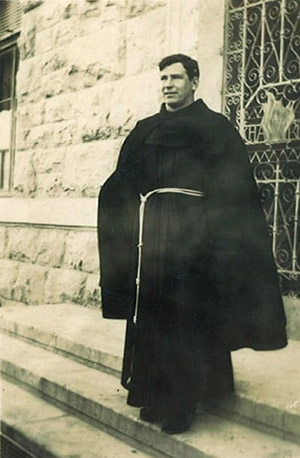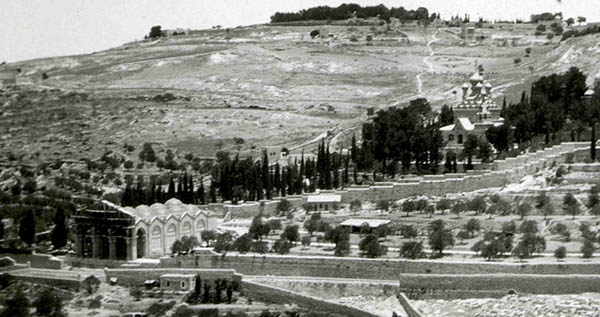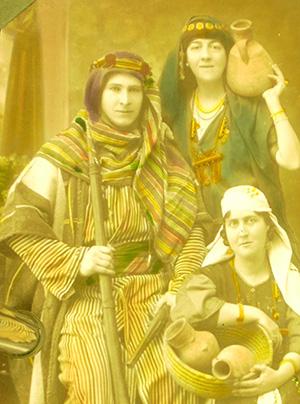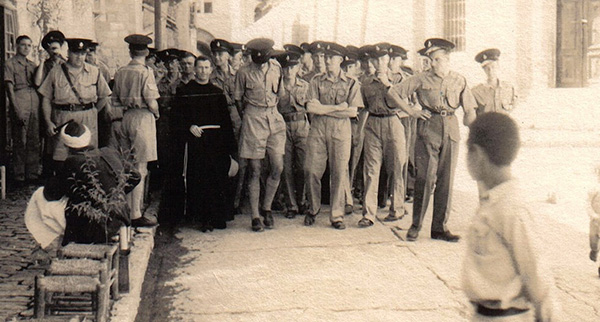Eugene Hoade: Jerusalem’s turbulent Irish priest, 1928–56
Published in Features, Issue 6 (November/December 2019), Volume 27One of the hundreds of Irishmen who pursued careers in colonial Palestine.
By Seán William Gannon

Above: Revd Dr Eugene Hoade—first arrived in Jerusalem in 1929 as vice-principal of Terra Sancta College, the city’s Franciscan secondary school.
On 6 December 1956, the custodian of the Basilica of Gethsemane in then-Jordanian East Jerusalem, Revd Dr Eugene Hoade, was declared persona non grata by Amman’s interior ministry, taken under armed guard to Qalandia airport and placed on a flight to Beirut. The summary and widely reported expulsion of this now-forgotten Irish Franciscan brought to an extraordinary end a quarter-century-long career in the city, during which he had played a prominent role in its religious and political life.
Background
Hoade’s path to the priesthood had always been clear. Born in 1903, the eleventh of fifteen children born to devoutly Catholic farmers in Headford, Co. Galway, he was educated by the Franciscans at Multyfarnham College, Westmeath, and entered their noviciate in Killarney in September 1921. He was ordained in Rome six years later, one of five Hoade siblings to take holy orders. A redoubtable scholar, he studied at Louvain and the Gregorian University in Rome, which awarded him a doctorate in theology in 1928. Hoade briefly returned to Ireland, ministering at the Franciscan centre on Dublin’s Merchant’s Quay and reading Celtic Studies at UCD, before going to Jerusalem at the request of the minister-general to assume the vice-principalship of Terra Sancta College, the city’s Franciscan secondary school. He was subsequently promoted to principal. Despite an onerous workload, he found time to pursue his own scholarly interests, publishing prodigiously on biblical archaeology and history (subjects on which he was an acknowledged authority) and on issues of more contemporary concern, particularly those pertaining to Palestine’s Christian holy places. His Guide to the Holy Land went through 23 reprints between 1942 and 1984 and is still well regarded today. He was also a talented linguist and co-produced English translations of several Greek, Italian and Arabic religio-historical tracts, as well as English-language textbooks for Franciscan Arab schools.
Custodian of Gethsemane Basilica
Hoade so distinguished himself in Palestine that he was appointed custodian at Gethsemane in December 1937, the first Irishman ever elevated to this prestigious position. In this capacity he became a tireless lobbyist for Latin religio-political rights, culminating in his active support for the Vatican-backed campaign to have Jerusalem designated an internationally controlled corpus separatum as per the 1947 United Nations Palestine partition plan. So influential a voice did Hoade provide on this subject that he was placed on a short list of candidates for the proposed post of special commissioner for the city in 1948. He also worked as an official adviser to the Palestine government on Catholic affairs, most significantly during the Second World War, when the issue of resident citizens of non-Allied belligerent countries arose. Hoade maintained a high public profile when Gethsemane, situated just to the east of Jerusalem’s Old City, came under Jordanian control in consequence of the 1947–9 Arab–Israeli War. Most notably, he was chairman of Jordan’s Famine Relief Committee and sat on its tourism board.

Above: Basilica of the Agony at Gethsemene (foreground, bottom left), c. 1935. Hoade was appointed as its custodian in December 1937.
Hoade’s official standing in Palestine had been secured in September 1938 when he was appointed Catholic chaplain to the Palestine Police. Three months previously, the Colonial Office was exhorted to select strong candidates for police chaplaincy posts on the basis that ‘weak chaplains would be worse than none at all’, and this advice was clearly heeded in Hoade’s case: he maintained a formidable presence within the force—admired, respected and feared in equal measure by Catholics and non-Catholics alike. Hoade took a proactive interest in the spiritual well-being of his Catholic charges, travelling around police stations hearing confessions, ordering the less observant to Sunday Mass and taking tours to holy sites. (Hoade was also tour guide of choice for visiting international dignitaries, and he led the Irish National Pilgrimages to the Holy Land that took place during his time there.) Moreover, he extended his remit to cover non-religious matters as well. For example, he was occasionally co-opted to help dissuade Catholic policemen from marrying Palestinians, particularly Jews, and he interceded with the authorities on behalf of policemen seeking compassionate leave or facing serious reprimand. He was also extremely solicitous of his co-religionists’ professional advancement, and was widely believed to hold great sway over promotions to and within the Palestine Police gazetted ranks, especially during Major Michael McConnell’s time as deputy inspector-general in 1943–6. (McConnell was a fellow Irish Catholic from Cork.) As one deputy police superintendent (DSP) subsequently put it, ‘Between them they seemed to select men for promotion to all ranks being biased towards good Catholics’, and the data on Palestine Police promotions do indicate disproportionate Catholic success during this time. McConnell made Hoade himself an honorary DSP (which did little to dispel perceptions of pro-Catholic conspiracy), which allowed him to go about armed. Consequently he always carried a pistol under his habit, which, together with the fact that he was unafraid to ‘get physical’ if required, earned Hoade the moniker ‘the fighting padre’ among Palestine Police personnel.
Anti-Zionist

Above: Hoade posing in Arab dress soon after his arrival in Jerusalem in 1929. He self-identified with the Palestinian cause. (Irish Franciscan Archive)
Amman cited Hoade’s ‘suspected political activities’ as its reason for ridding itself of its turbulent priest, and few doubted the truth of this charge, for Hoade had long been energetically anti-Zionist in outlook, his views profoundly informed by the theological Judaeophobia pervasive in contemporary Catholic thinking. For him, the Jewish claim to Judaea had ended ‘in the infamy of Calvary’. Their dispersal in the first and second centuries AD was a punishment divinely ordained, and only by atoning through Christian conversion could the Jews, as a nation, return. Nor was Zionism simply a problem in the theological abstract: drawing on ancient anxieties about Judaism’s enduring enmity towards its Christian supplanters, Hoade saw it as a clear and present danger to Palestine’s Christian heritage. Under this aspect, he believed damage caused to churches and shrines by Israeli forces during the 1947–9 war to be part of a sanctioned systematic desecration, and he was the source of many of the reports on this subject that appeared in the Irish Catholic press at the time. Hoade’s opposition to Zionism also had a political-national dimension, however. He came from a staunch Irish advanced nationalist background—his mother, Margaret, ran an IRA safe house during the War of Independence and three of his brothers were actively involved—and he saw Palestine’s Arabs as the victims of a ‘Zionist colonialist’ enterprise akin to that which Britain had visited historically on Ireland. In fact, Hoade himself was routinely described in 1950s press reports as a ‘former Irish rebel’, although hard evidence has yet to emerge.

Above: Hoade leading a tour of Jerusalem’s Christian sites for the Palestine Police c. 1944. (Martin Higgins)
When it came to militant anti-Zionist resistance, Hoade also had recent previous form. An Associated Press report on Israel’s refusal to allow him entry into its side of Jerusalem in April 1954 described him as a ‘presumably suspect old enemy of Israel’, and noted tales of how he ‘took up arms against and fought against Israel in the Palestine War of 1948’. Hoade condemned these claims as malicious. His involvement in that war’s battle for Jerusalem has since been confirmed by several sources, however, including Arab Legion officers who recalled him providing training in the use of bazookas and manning the old city walls. His hostility towards Israel remained afterwards unconcealed. As the American mythologist Joseph Campbell observed after meeting him in Gethsemane in the mid-1950s, Hoade was ‘very strong in his feelings for what the Jews had done’ to Palestine’s Arabs and he self-identified with their cause, declaring that ‘we are at war … six years of it’. His anger was exacerbated by ‘what the Jews had done’, as he saw it, to the Palestine Police, which had formed the front line against the Zionist insurgency against British rule waged with varying degrees of intensity during the mandate’s final nine years, and 116 British and Irish policemen died at their hands. As a DSP, chaplain and friend, Hoade was deeply affected by these deaths.
Expulsion
Hoade’s ‘war’ ended with his summary expulsion. Amman did not disclose details of his ‘suspected political activities’ and rumours have swirled since. Although the relevant files are restricted, it is clear that he was actively involved with Palestinian Arab militias conducting small-scale attacks on Israel from East Jerusalem, and his Franciscan confrères were certainly of the opinion that this was his expulsion’s proximate cause. Hoade resettled in Rome, where he lived out the rest of his life. He first took up residence at the Irish Franciscan College (St Isidore’s) and later at St John Lateran’s, the cathedral church of the diocese of Rome, where he worked as a penitentiary. Although the Vatican had been somewhat less than sympathetic to Hoade’s plight (shortly after his expulsion, a high-ranking member of the Vatican secretariat of state dismissed him in conversation with the Irish ambassador as ‘something of a busy-body [who] got mixed up in all sorts of matters, including political’), it recognised his expertise in Middle Eastern ecclesiastical affairs and he continued to work in this field. For example, he acted as consultor for the Sacred Congregation of Oriental Churches and adviser to the head of the Armenian Catholic Church, Cardinal Gregorio Agaganian, at the Second Vatican Council, and was centrally involved in the planning of Pope Paul VI’s historic visit to Israel in 1964. Hoade died on St Patrick’s Day 1972 and was buried in the Irish Franciscan vault at the Campo Verano. Requiem Masses in Galway and Dublin drew huge congregations. The Dublin service was attended by several Irish former Palestine policemen and colonial servants who had known him in Palestine (including Michael McConnell), a testament to the esteem in which he had there been held.
Ambiguous attitudes towards the British Empire
Eugene Hoade was just one of hundreds of Irishmen who pursued careers in colonial Palestine. Most served in the Palestine Police, and Hoade’s period as Catholic chaplain coincided with an upsurge in Irish enlistment; Irishmen accounted for 11% of recruits in 1938–9, rising to almost 20% in the final twelve months of the British mandate. Irishmen were also well represented in Palestine’s other colonial services during this time, particularly in the colonial legal service, where they accounted for over one-fifth of its personnel. That the great majority of these men came from south of the Irish border highlights the ambiguities inherent in attitudes towards the British Empire there after 1922, for while independent Ireland’s political culture was reflexively anti-imperialist, incorporating broad public support for colonial independence campaigns, its citizens grasped the opportunities for personal and professional advancement that the imperial services provided. In fact, they enlisted as colonial administrators, doctors, lawyers, policemen, educators and engineers in such numbers that a roll-call of Britain’s imperial ruling caste in the four decades prior to the Colonial Office’s closure in 1966 reveals a significant ‘southern’ Irish presence right across the dependent empire.
In addition, when it came to imperial service, even the most radical of Irish nationalist politics could take a back seat. This was, indeed, exemplified by Hoade. Following his debarment from Israel in 1954, he was described by a friend as ‘an Irish rebel in his student days … long since become a loyal supporter of the Empire’, and by the early 1940s he was certainly part of Palestine’s imperial élite. The accommodation of Irish advanced nationalists like Hoade to British imperial employ was fostered by the strong Anglicising current in colonial life and Weberian ‘status honour’ amongst the colonial ruling class. Furthermore, while few undertook colonial service with a ‘civilising mission’ in mind, many came to view their work in that light; and, by refracting imperial service through the prism of a ‘benevolent colonialism’ charged with the gradual advancement of still-primitive ‘subject races’ towards eventual self-rule, they created a discourse in which Irish republicanism and British imperialism could reconcile. Thus, for Hoade, British rule in Palestine provided a legitimate framework for the future realisation of then-inchoate Arab ‘national’ aspirations, and the ‘Zionist colonialist plot’ to frustrate them (reminiscent of the Cromwellian dispossession in Ireland) had to be forcibly repelled.
The disconnection between ‘southern’ Irish societal anti-imperialism and Irish imperial service per se was not simply the province of those who enlisted in Britain’s colonial services, for, apart from a predictable outcry on the republican fringe, Irish enlistment was almost entirely uncontroversial. National newspapers (including de Valera’s Irish Press) routinely carried advertisements for posts in their various branches, as did professional journals. Perhaps more significantly, the widely read provincial press frequently published good wishes for local enlistments, news of and reports on their career progress, and obituaries of those who died. Moreover, colonial services’ recruitment was frequently facilitated by government departments, while testimonials for candidates were provided by pillars of Irish society such as Gardaí, peace commissioners, teachers and Catholic clergy. In the final analysis, British imperial service was an unremarkable aspect of Irish life for those who served, their families and their communities.
Seán William Gannon is the author of The Irish Imperial Service: policing Palestine and administering the Empire, 1922–1966 (Palgrave Macmillan, 2019).
FURTHER READING
E. Horne, A job well done: being a history of the Palestine Police Force 1920–1948 (Lewes, 2003).
K. Jeffery (ed.), ‘An Irish Empire’? Aspects of Ireland and the British Empire (Manchester, 1996).
T. McMahon et al. (eds), Ireland in an imperial world: citizenship, opportunism, and subversion (Basingstoke, 2017).
J.J.W. Murphy, ‘Irishmen in Palestine 1946–1948’, Studies: an Irish Quarterly Review 40 (157) (1951).
















